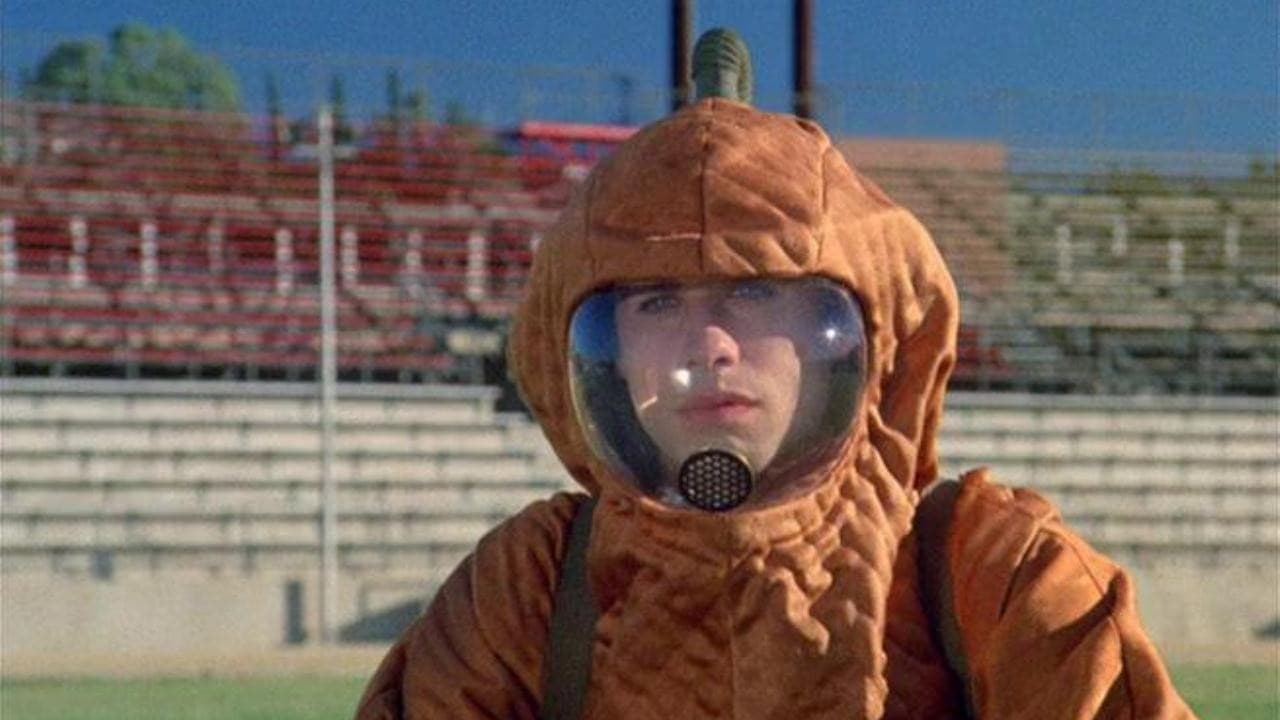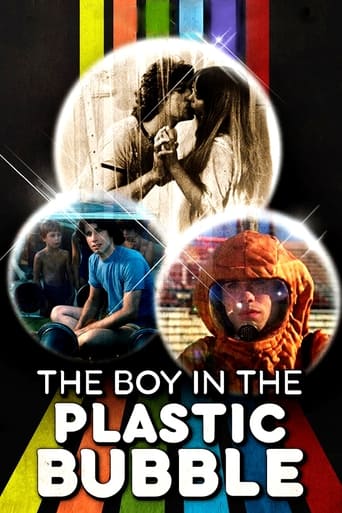Spoonatects
Am i the only one who thinks........Average?
Comwayon
A Disappointing Continuation
RipDelight
This is a tender, generous movie that likes its characters and presents them as real people, full of flaws and strengths.
Patience Watson
One of those movie experiences that is so good it makes you realize you've been grading everything else on a curve.
moonspinner55
John Travolta effortlessly made the leap from TV Sweathog to teenage heartthrob with this popular ABC movie-of-the-week, executive produced by Aaron Spelling and Leonard Goldberg, about a boy born without immunities who is taken out of the hospital after his first four years to live at home in a germ-free zone. The adults of the piece (Robert Reed and Emmy-winner Diana Hyland as Travolta's parents, Ralph Bellamy as his doctor) are good, but audiences in 1976 were mostly interested in Travolta's presence. He doesn't give a multi-layered performance--he's overeager when trying for simple charm, and he's least convincing in situations where he's meant to be hurt--but, for a newcomer, he certainly displays enormous self-confidence and charisma. Girl-next-door Glynnis O'Connor rolls her eyes and grins like she's never talked to a boy before (which may be the fault of director Randal Kleiser), although the two match up well in the puppy love department. The film's final moments--aimed directly at budding romantics--is a bit much, yet overall it's well-made and memorable, a touchstone movie for kids in the '70s.
kevin olzak
1976's "The Boy in the Plastic Bubble" has gained legendary status in the careers of both John Travolta and Glynnis O'Connor, for it is due to their performances, and the genuine anguish in its depiction of budding adolescent love, that this TV-movie still endures beyond what all of the naysayers would have you believe. The early scenes with the very young Tod do tend to be overtly cloying, but it immediately establishes the young Gina's attitude toward her new neighbor, at one point actually calling him a 'monster.' As the years pass, she really only sees him once a year on his birthday, the only girl in attendance, now simply looking at him as a curiosity. Once the exposition concludes, the film can take its time with their relationship, how he's always watching her from his expansive pad, isolated from any germs that could easily spell death for him. It really is a marvelous script, Glynnis O'Connor's Gina at first willing to humiliate Tod just to impress her friends (among them Kelly Ward, Vernee Watson, and P. J. Soles), but gradually coming to realize how much he has idolized her, which both flatters her and scares her ("Tod, what are you doing to me?"). Yes, it may be carefully calculated, even contrived, but when the actors deliver, it has the desired effect. As for the ending that so many dislike, how could they conclude it any other way? SPOILER AHEAD- As Paul Williams sings "What Would They Say" (uncredited in the film itself), Tod chooses to be free to pursue his only love, leaving behind the dedicated parents responsible for his well-being, still asleep and unaware, equal parts heart warming and tragic, just like the angst of teenage love. No matter how old we get, we never forget that first love, or the obstacles that needed to be overcome, which Williams beautifully renders as Gina rides away with Tod at her back, toward a future unknown. What a delicate balance that couldn't be bettered, and it remains difficult to watch to this day without tearing up. Robert Reed, just as in THE BRADY BUNCH, is a warm and loving father, and this film, along with ROOTS, reignited his career back toward drama. Diana Hyland will always be remembered as John Travolta's first true love, tragically dead of cancer less than five months after this broadcast. The natural smile, fresh wholesomeness (even in a revealing bikini), a sweet girl next door quality that every boy fell in love with- the 19 year old Glynnis O'Connor was a huge cult figure at the time, on a par with Maureen McCormick, Jodie Foster, Tatum O'Neal, or Kristy McNichol, but appears to be criminally forgotten nowadays; she would continue to score impressively in films such as "California Dreaming" and "Those Lips, Those Eyes." Only months away from "Saturday Night Fever," John Travolta's movie career consisted of a bit in "The Devil's Rain" and a supporting villain in the just completed "Carrie," his dramatic capabilities as yet untested, so this sensitive but not saccharine portrayal was very real and precise (how about the reference to masturbation with fellow inmate John Friedrich, when they easily could have shied away from an honest depiction). This movie's cult should continue to grow, in spite of the dated 70s fashions, despite the raspberries from numerous hipsters, simply because the heart never stops yearning and no one forgets their first love.
classldy
the only thing I have to say about this movie; is that Travolta got paid the measly salary; and an affair from Hyland for this piece of dreck. Probably after Kotter and before Saturday Night Fever; he may have taken any God Awful script to keep in the acting business.Seeing it was produced by Spelling is another hallmark of bad taste. Even though it was based on a true story the extents that the parents had to go through to keep him alive. I don't know any family who could considerably bare the expenses that the enclosures would cost; seeing that they did live in a log cabin. To through all that away he should have died at the beginning; and left questionable about his future.
leczorn
During one of my frequent raids of the $1 DVD bins, I found this 1976 made for TV movie. When reading the synopsis on the package I saw that it was "based on a true story" of a boy named Tod Lubitch (played by John Travolta) who was born without an immune system and had to live in a sterile environment. That brought to my mind a Houston boy named David Joseph Vetter III who was in the news a lot when I was growing up. David had the same problem, lived in the same environment and died at the age of 12.Upon my research I discovered that this movie is fictional. There was no Tod Lubitch. "The Boy in the Plastic Bubble" was inspired by the aforementioned David but isn't about him. $1 DVDs have a bad habit of providing false information and the "true story" claim is yet another example, as is the cover photo of Travolta, which appears to be only a few years old. He was actually in his early 20s when this movie originally aired.Now for the movie. After spending a few minutes each showing Tod's life as an infant and a four year old - when he begins spending some time at home, where a sterile room is set up for him - the remainder of the movie shows him around the age of 17.Despite the way he's forced live, Tod is a happy kid who has a close relationship with his parents. But he holds out hope that someday his body will build up enough immunities for him to leave his sterile environment.Gradually, Tod is able to live a more normal life. He is sometimes wheeled outside in a protective cart. He participates in high school through televisions and cameras set up in his room and the classroom. And later he begins attending school in person by wearing a protective suit much like one an astronaut wears. Tod actually blends in fairly well with the other students. He is a victim of some insensitivity but not a lot and he ends up graduating.As the movie progresses, Tod falls in love with classmate and next door neighbor Gina Biggs (Glynnis O'Connor). In one scene about midway through the movie, she pretends to express romantic interest in him but then he realizes she was just trying to win a bet with two of her male friends, which devastates Tod. But she later has a change of heart and falls for Tod, too.This leaves Tod with a monumental decision - continue to remain in his sterile environment, in which is only human contact is gloved hands, or risk his life to be with Gina.For the most part, I like this movie. It tells a bittersweet story in a very moving way. Travolta's performance is convincing and he shows great signs of things to come. I found myself feeling really sorry for Tod. The supporting cast is also strong and includes the late Robert Reed ("The Brady Bunch") as Tod's father, Johnny Lubitch. I think this is the only role I've ever seen Reed play other than Mike Brady. He displays good serious acting skill.But the movie is marred by its unclear ending. And I noticed one other significant flaw - in a scene in which Tod's protective suit runs out of oxygen, he rushes into the sterile section of his classroom, aided by classmates, and takes the suit off inside. It seems to me that the outside of the suit would be carrying germs, which would contaminate the sterile section and open Tod to germs that very well might kill him.The technical quality of the DVD that I have isn't great and looks like it might have been a direct transfer from a master tape that had been sitting on a shelf for years. But the quality is decent enough to watch comfortably.Overall, this is a very good movie that is well worth the dollar. 7/10.

